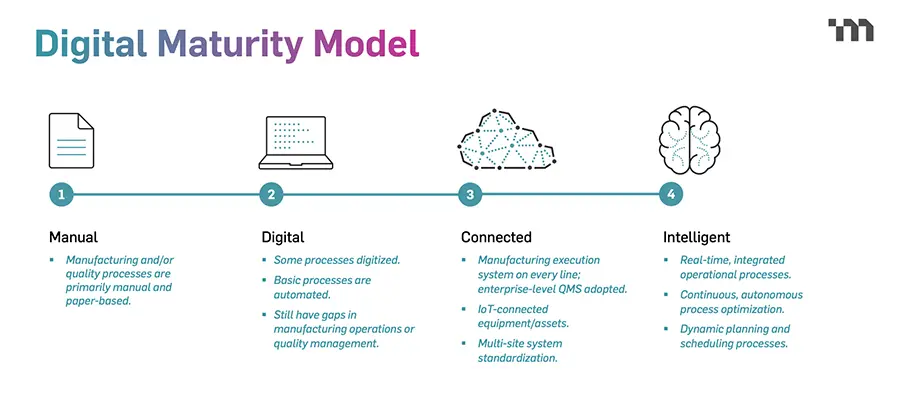
GxP Lifeline
Embracing Digital Maturity: The Transformative Power of eQMS and EBR in Pharma Quality Management

In the rapidly evolving pharmaceutical manufacturing landscape, the integration of connected quality management systems (QMS) and electronic batch records (EBR) has become an indispensable asset. As pharma manufacturers traverse the complex terrain of digital maturity, understanding the role of these modern technologies can markedly enhance operational efficiency and competitive advantage in the industry.
The State of Digital Maturity in Life Sciences
A recent webinar examined research conducted by MasterControl in which over 300 professionals from pharmaceutical, medical device, and biotechnology sectors were surveyed. The study revealed that an encouraging 58% of organizations consider digitization a top priority and have formally established digital transformation strategies. This shift toward digital maturity is not just about adopting technology – it’s also about integrating digital processes effectively to enhance overall quality and production performance.
Understanding the Digital Maturity Model for Pharma Manufacturing
The digital maturity model introduced during the webinar illustrates the four progressive steps organizations take as they become more digitally mature:
Manual:
Heavily reliant on manual, paper-based processes.Digital:
Basic digital processes are in place but remain siloed and disconnected.Connected:
A significant leap in digitization where manufacturing execution, quality management, and other key systems are not just digitized but are tightly interconnected.Intelligent:
The pinnacle of digital maturity, where real-time data drives dynamic decision-making and process adjustments as well as predictive insights.
Currently, many life sciences organizations find themselves between the Digital and Connected stages, emphasizing the need for a holistic approach to integration and system interoperability.
The Strategic Imperative of Review by Exception
The practice of review by exception is a core component of leveraging a fully digital eQMS. Rather than requiring tedious and time-consuming line-by-line reviews, this method prioritizes the examination of anomalies or exceptions in data. Thus, review by exception facilitates quicker responses and reduces the time spent on routine assessments. The adoption of fully integrated eQMS and EBR systems plays a crucial role here, enhancing the precision and efficiency of quality checks, which are crucial for maintaining regulatory compliance and accelerating time to market.
The Challenges of Full Integration
Despite the clear advantages of enhanced digital maturity, the integration of eQMS and EBR systems is not without challenges. Less than half of quality management professionals surveyed reported that their organizations have full integration between their QMS and EBRs. This gap underscores a significant potential for improvements in system connectivity that could drive higher operational efficiency and enhance data integrity.
Addressing the Integration Challenge
Efficiently connecting various systems requires a robust platform that can handle complex data integrations effortlessly, whether the systems involved are enterprise resource planning (ERP) systems, laboratory information management systems (LIMS), manufacturing execution systems (MES), or any other core component of your tech stack.– Instead of managing multiple point-to-point integrations, which can be cumbersome and error-prone, adopting a unified, purpose-built data platform can simplify this process. Taking a platform approach not only streamlines data integration across systems but also supports more advanced analytics and real-time data processing, crucial for dynamic and highly regulated industries like pharmaceuticals.
Harnessing Competitive Advantage Through Digital Transformation in Manufacturing
The journey toward higher levels of digital maturity, particularly moving from the Digital to the Connected and Intelligent stages, holds profound implications for competitive positioning in life sciences manufacturing. Companies that can effectively integrate and utilize advanced eQMS and EBR technologies not only streamline their operations but also significantly shorten their time to market – a critical factor in an industry fueled by innovation and timely product delivery.
Moreover, the strategic use of data through advanced analytics can unveil insights that were previously obscured by manual or disjointed processes, which facilitates a deeper understanding of operational dynamics and enhances decision-making processes.
Conclusion
The transition to a fully digital and connected quality management environment takes more than just adopting new tech – it's about refining processes and establishing a culture that embraces digital advancements. Pharmaceutical and other life sciences companies in must assess their current digital maturity levels and strategically plan their trajectories toward an integrated, intelligent operational ecosystem in which modern eQMS and EBR solutions play an essential role in keeping them at the forefront of the digital vanguard.
Free Resource

Enjoying this blog? Learn More.
The Ultimate Guide to Pharmaceutical Quality Management
Download Now